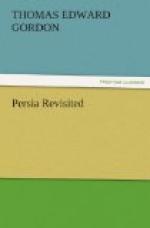The voyage to Baku was uneventful. There are two Astaras, one Persian, the other Russian, with the frontier stream between them. The steamer remained part of the night at the former place, and moved in the morning three miles to the anchorage opposite the latter. There the Russian Customs officers came on board to examine luggage. The first mate of the steamer, a Swedish Finn, attended the search proceedings, and became much interested In a rusty pistol which was found in the luggage of one of the deck passengers. The question arose, Was the pistol loaded? and he undertook to find out. He raised the hammer to full cock, and, placing the muzzle in his mouth, he blew down the barrel, with his finger on the cap nipple, to feel if the air passed through. He naively explained to me the certainty of this mode of discovering whether a percussion arm is loaded or not. In this instance the pistol was thought to be loaded, but it was found to be only choked with rust.
I had intended to return via Constantinople, but on arrival at Baku I learnt that the damage done to the railway between Tiflis and Batoum by a storm of unprecedented fury and unusually heavy floods was so extended and bad as to stop all traffic for a long time. I went to Oujari, a station one hundred and sixty miles from Baku, where I was hospitably entertained by Mr. Andrew Urquhart, a Scotch gentleman, established there with a factory and hydraulic presses for the liquorice-root industry, and from there I entered into telegraphic communication with Tiflis to ascertain if I could get a carriage to Vladikavkas, so as to join the railway and proceed home through Russia. There was such a number of passengers detained at Tiflis, en route to Batoum, and all anxious to go to Vladikavkas by road, that I found I should have to wait long for my turn. Accordingly, after six days’ stay with my hospitable friend, I went back to Baku and took steamer to Petrovsk, whence I travelled by rail to Moscow and St. Petersburg on my way to England via Berlin.
A great petroleum field is now being developed near Grosnoje, a station on the Petrovsk Vladikavkas railway, north of the main Caucasus range; and an English company has had the good fortune, after venturing much, to find the fountain for which they and others have long looked. After carrying on ‘sounding’ operations for some time, and sinking several wells, oil was at length ‘struck’ towards the end of August at a depth of three hundred and fifty feet, and it came up with such force as to reach a height of five hundred feet above ground. The well was on a hillside, and the valley below had been dammed up previously to form a reservoir capable of holding a large supply of oil. But such was the flow from the fountain, that after a few days it rose above the dam, and, although every effort was made to raise and strengthen it, the oil overflowed, and the top of the dyke was carried away. Millions of gallons were lost, though on its course down the valley the oil completely filled another reservoir, which had been prepared for the oil of a rival company, but which never came from their own wells. Eventually the main flow of oil found its own level in a low-lying piece of ground, about four miles below the broken dam.




